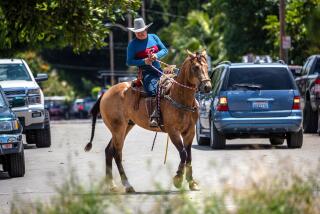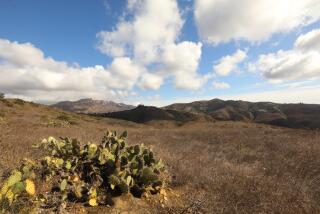Murdock Stands Firm Against Local Interference in Business
- Share via
A 17-year resident of Ventura County, billionaire David H. Murdock has made news as a local developer, philanthropist and international businessman. But he has rarely talked to reporters about any of it.
In a recent interview, Murdock discussed not only his Sherwood Country Club development but also some of the local controversies in which he has been involved over the years.
He condemned local interference in private business, insisted he had never gained any special favors from county officials overseeing his Sherwood development and said his relocation of about 1,400 mature trees has led to the death of only six.
As chairman and 23% stockholder of Dole Food Co., Murdock said he decided in 1992 to locate the corporation’s new red-brick, 650-employee world headquarters across the Los Angeles County line in Westlake Village because of policies in Thousand Oaks.
“I do not like the fact that in Thousand Oaks the like to tell you everything you can do and can’t do,” he said.
Particularly irksome, he said, is a city law that controls the color of buildings, an ordinance that forced auto dealer Robert Nesen, a Sherwood director, to repaint a building deemed to be too white.
“I don’t think any governing body should have such rights,” Murdock said. “When someone can tell you the color of your building, they have gone too far, in my book.”
Murdock said he considered moving out of Ventura County entirely at one point, because of what he sees as unnecessary government interference in private enterprise.
He would not comment further. But he has had run-ins with county officials.
In 1989, he won a high stakes tax dispute with the county assessor when a judge ruled that 200 blue-ribbon Arabian horses bred at Murdock’s Ventura Farms qualified as race horses.
The decision brought Murdock an immediate refund of $115,000, since race horses are not taxed at their true value.
A year later, a grand jury investigated Murdock’s relationships with county officials and his attempt to gain county approval to force longtime Lake Sherwood residents to buy the lake for $2.6 million or pay high lake maintenance fees.
After county supervisors balked, Murdock withdrew his plan to sell the lake. He is now completing a long-term plan to maintain the lake at his own expense.
The grand jury found no criminal wrongdoing, but recommended creation of an ethics board to write a code of conduct for county employees. Murdock had hosted a barbecue for many officials overseeing his project in 1989, even though several key decisions were pending, grand jurors noted.
The inquiry, Murdock now says, was much ado about little. And Dist. Att. Michael D. Bradbury later wrote him a letter saying that he was not the focus of the inquiry, Murdock said.
“It was a source of a great deal of embarrassment to me,” he said. “It was a lot of noise and not much action I know of. I was called to testify and I testified. That was all of it.”
One needs only to look around at the beauty of his project to recognize what a plus it is for the county, he said.
“Was anything here gotten improperly? . . . What was it?” he said. “I didn’t get any great help I could see. The officials feel we have a very find project.”
Another source of irritation were early complaints that Murdock would kill hundreds of ancient oak, red shank and sycamore trees by transplanting them around his golf course.
“All too frequently people think just because you make money, you’ve got to make money by destroying,” he said. “It’s just the opposite here. I brought trees that no one could see and put them in places where people could see them. . . .I checked with our tree man the other day. We have lost six.”
More to Read
Sign up for Essential California
The most important California stories and recommendations in your inbox every morning.
You may occasionally receive promotional content from the Los Angeles Times.













